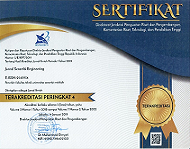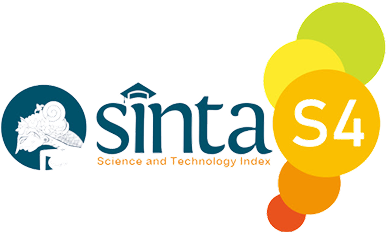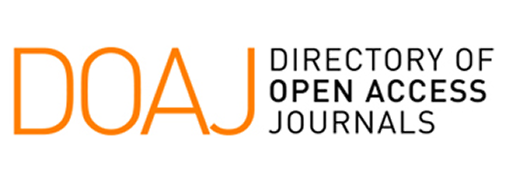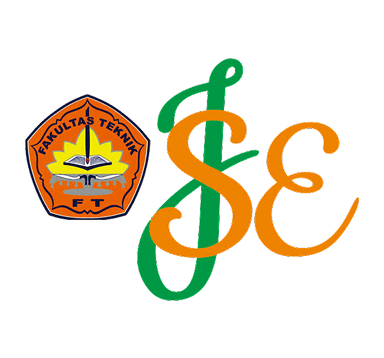Persepsi Perilaku Sanitasi Masyarakat di Kawasan Semi-Perkotaan Pasca Deklarasi Open Defecation Free dengan Pendekatan IBM-WASH dan KAP
Keywords:
the acceleration of ODF, open defecation free, IBM-WASHAbstract
The Community-Based Total Sanitation (STBM) programme is the government's effort to address the issue of open defecation in Sumedang Regency, with ODF villages reaching 81.23% by 2021. Sawahdadap Village, Cimanggung District, Sumedang Regency, is a rural-urban area that has declared ODF status. The acceleration of ODF has pushed the STBM programme to continue its positive impact and complete the first pillar of STBM, which is ODF. However, this acceleration is forcing all stakeholders to achieve the target without considering the sustainability of the sanitation system afterwards. This study aims to understand perceptions of sanitation behaviour and sustainability in rural-urban areas that have declared ODF status. The EFA analysis showed that community perceptions of the societal/structural (0.684) and individual (0.501) variables contributed the most, with a total variance of 62.82% and 75% of respondents giving positive responses. The KAP analysis of stakeholder perceptions showed knowledge at 94% (SD 0.671), attitude at 87% (SD 0.827) and practice at 93% (SD 1.136), with an average KAP of 91%, confirming that stakeholder perceptions of community sanitation behaviour are good. However, Policy/Regulation (25%) and Financing/Distribution (9%) showed poor scores. Data normalisation indicates that 81% of the community has good sanitation behaviour, while the remaining 19% require additional recommendations and strategies.
References
[1] A. Mahyeda, “Pola Perubahan Ruang Semi Perkotaan Dan Pengaruhnya Terhadap Hak Tanah Formal dan Informal,” 2017, Diakses: 3 Oktober 2023. [Daring]. Tersedia pada: https://www.academia.edu/35546558/Pola_Perubahan_Ruang_Semi_Perkotaan_Dan_Pengaruhnya_Terhadap_Hak_Tanah_Formal_dan_Informal
[2] BPS, “Persentase Penduduk Daerah Perkotaan menurut Provinsi, 2010-2035.” Diakses: 4 Oktober 2023. [Daring]. Tersedia pada: https://www.bps.go.id/statictable/2014/02/18/1276/persentase-penduduk-daerah-perkotaan-hasil-proyeksi-penduduk-menurut-provinsi-2015---2035.html
[3] N. Azizah, Y. Ardillah, I. P. Sari, dan Y. Windusari, “Kajian Sanitasi Total Berbasis Masyarakat (STBM) di Lingkungan Kumuh Kota Palembang: Studi Kualitatif,” Jurnal Kesehatan Lingkungan Indonesia, vol. 20, no. 2, hlm. 65–73, Okt 2021, doi: 10.14710/jkli.20.2.65-73.
[4] K. S. BPS, Kecamatan Cimanggung dalam Angka 2022. BPS, 2022.
[5] R. Dreibelbis dkk., “The Integrated Behavioural Model for Water, Sanitation, and Hygiene: a systematic review of behavioural models and a framework for designing and evaluating behaviour change interventions in infrastructure-restricted settings,” BMC Public Health, vol. 13, no. 1, hlm. 1015, Des 2013, doi: 10.1186/1471-2458-13-1015.
[6] R. Ronny dan B. Y. Bandjuka, “Behavior Water Users in Urban Communities with Integrated Behavioral Model (IBM) Approach:,” dipresentasikan pada 1st World Conference on Social and Humanities Research (W-SHARE 2021), Makassar, Indonesia, 2021. doi: 10.2991/assehr.k.220402.046.
[7] Susilawati, R. H. Harahap, M. B. Mulya, dan L. S. Andayani, “Behavior model of community-based sanitation management in coastal areas: confirmatory factor analysis,” Heliyon, vol. 8, no. 11, hlm. e11756, Nov 2022, doi: 10.1016/j.heliyon.2022.e11756.
[8] L. R. Sunaryo dan P. Soewondo, “Determinants of the influence of community participation on the sustainability of local system community-based sanitation programs in Temanggung Regency,” E3S Web of Conf., vol. 485, hlm. 02009, 2024, doi: 10.1051/e3sconf/202448502009.
[9] D. Daniel dkk., “Financial, institutional, environmental, technical, and social (FIETS) aspects of water, sanitation, and hygiene conditions in indigenous - rural Indonesia,” BMC Public Health, vol. 21, no. 1, hlm. 1723, Sep 2021, doi: 10.1186/s12889-021-11800-x.
[10] K. F. Safira, A. Nastiti, A. S. Kurniati, dan A. D. Sakti, “Development and validation of instrument to measure citywide inclusive sanitation (CWIS Scale) for Low-and Middle-Income Countries (LMICs),” E3S Web of Conf., vol. 485, hlm. 04005, 2024, doi: 10.1051/e3sconf/202448504005.
[11] D. E. Montaño dan D. Kasprzyk, Theory of reasoned action, theory of planned behavior, and the integrated behavioral model, Fourth Edition., vol. 4. Jossy-Bass A Wiley Imprint, 2008.
[12] M. Fishbein dan I. Ajzen, “Health Behavior and Health Education | Part Two, Chapter Four : Introduction.” Diakses: 3 April 2024. [Daring]. Tersedia pada: https://www.med.upenn.edu/hbhe4/part2-ch4-introduction.shtml
[13] A. Afzal, M. Javed, dan T. Jabeen, “Integrated behaviour change intervention for sustainable community development: a KAP study of WASH in district Gujrat, Pakistan,” Journal of Water, Sanitation and Hygiene for Development, vol. 12, no. 11, hlm. 838–850, Nov 2022, doi: 10.2166/washdev.2022.243.
[14] M. I. Novanta, Strategi Optimasi Pengelolaan Sanitasi Berkelanjutan di Kawasan Permukiman Kumuh Melalui Program Peningkatan Tampilan Fisik (Studi Kasus: Kampung Pelangi Bekelir, Tangerang dan Kampung Pelangi Code, Yogyakarta). dalam Tesis. ITB, 2022.
[15] Prof. Dr. Sugiyono, Metode Penelitian Kuantitaif dan Kualitaif dan R&D. Alfabeta,Bandung, 2013.
[16] D. Suhr, “200-31: Exploratory or Confirmatory Factor Analysis?,” University of Northern Colorado, 2004.
[17] R. Buana dan P. Soewondo, “Toward Open Defecation Free (ODF) Communities: Acceleration of Reducing Carbon Emissions from Domestic Wastewater in Rural-Urban Area,” IOP Publishing : The 10th T&T- The 1st IAA Conference 2024, 2024.
Downloads
Published
Issue
Section
License
Copyright (c) 2024 Reksa Buana, Prayatni Soewondo (Author)

This work is licensed under a Creative Commons Attribution 4.0 International License.












